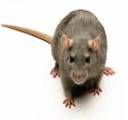
|
Rat and mice (mouse) will contaminate your food supply with it's feces and urine. They gnaw through electrical wiring, causing fires and failure of freezers, clothes dryers and other appliances. Rodents are known to carry a wide variety of diseases transmissible to humans such as Hantavirus and Salmonellas. |
|
Rat - Mice - Mouse |
|
These rodents, mice and rats, will eat almost anything, but prefer cereal grains, seeds, or sweet material. They require very little water, obtaining most of their water needs from their food. Mice can consume large quantities of stored seed and grains from farmers, warehouses, and homes. |
|
Where do rats live outside? |
|
· Under wood piles or lumber that is not being used often · Under bushes, vines and in tall grasses that are not trimmed or cut back · Under rocks in the garden · In cars, appliances and furniture that has been put outside and is no longer being used · In and around trash and garbage that has been left on the ground · In holes under buildings |
|
Where do rats live inside the home? |
|
· In the insulation of walls or ceilings · Inside the crawl spaces · Behind or under cupboards, counters, bathtubs and shower stalls · Near hot water heaters and furnaces · In basements, attics and wherever things are stored in boxes, paper or cloth |
|
What brings rats into my yard and neighborhood? |
|
· Garbage that rats can get into, like garbage cans with loose lids, plastic or paper bags, and litter. · Food for pets and birds. Birdseed on the ground, pet food in pet dishes, bread crumbs, etc. · Fruits and berries that have fallen to the ground. · Compost pile or worm bin. (do not put meat, fish, poultry, or dairy in the compost) · Dog droppings |
|
What do rats eat when they get inside the house? |
|
· THE SAME FOODS WE DO! · Foods, fats, oils that have been spilled and left on counters, floors, appliances and tables · Grains, cereal, oats, rice and vegetables like potatoes and carrots, in boxes and plastic bags · Pet food in boxes or bags · Any garbage that is not in a can with a tight lid |
|
· The time to act is before the signs (droppings) of a rat or mouse. · Stack fire wood 18 inches off the ground and away from all buildings. · Birdhouses and seed should be on poles and in trays rats can't get. · Keep garbage can lids closed tightly. · Plant bushes so they will stay at least 3 feet from your house. · Keep yards and alleys clean. Take junk to the dump! · If you feed them, they will stay. Pick up fruit and vegetables in your yard. · Do not compost any animal products (fish, meat, chicken, cheese, butter). Keep lids tight. · Use only rodent resistant composters. · In basements keep any food in closed containers that rats can't chew through. · Cover all openings to your house. Rats can get into very small places. · Do not leave your pet food outside. If your pet doesn't eat it, the rats will. · Roof rats get into your house from tree branches. Keep trees cut back and cover any openings in the eves. |
|
Rodent prevention is simple: Do not give food and shelter to these most unwanted guests! |
|
BUT- no matter how hard you try they will take up residence in your home or garage. |
|
Air out the building for at least 30 minutes by opening windows and doors and leave the building. Wear latex or rubber gloves and a dust mask while cleaning. Avoid raising dust that may spread the virus through the air: Do not vacuum, sweep or dust. Carefully wet down areas with disinfectant before cleaning. Use rags, sponges and mops that have been soaked in the disinfectant solution to wipe down counter tops, cabinets and drawers, mop floors and baseboards. Mix a solution of 1 cup bleach to 10 cups water or use a household disinfectant. Steam clean carpets, rugs, and upholstered furniture. Thoroughly spray or soak any dead mice, droppings, or nesting areas with disinfectant or bleach solution. Wash clothes and bedding in hot water and detergent. Set the dryer on high. To dispose of contaminated items, including dead mice, put them in a plastic bag. Seal the bag and put it in another plastic bag. Seal the outer bag and put it in your outdoor garbage can. When you are done, disinfect or throw away the gloves you used. Wash your hands or shower with soap and hot water. |
|
If you are cleaning out a building that has been closed up, such as a cabin, shed, or garage, or areas where rodent nesting material have been found, follow these steps. |
|
This is a simple solution which my grandfather used throughout his life eliminating rats and mice on his farm. Utilizing ingredients found in grocery and hardware stores. Farm & Home Safe Remedy |
|
Pest Control Home & Business Solutions |
|
Home Remedy Recipes / Pesticides / Animal Traps / Services |
|
(yours forever)
Contact Us email: info@pestcontrolrecipes.com |

|
info@pestcontrolrecipes.com |